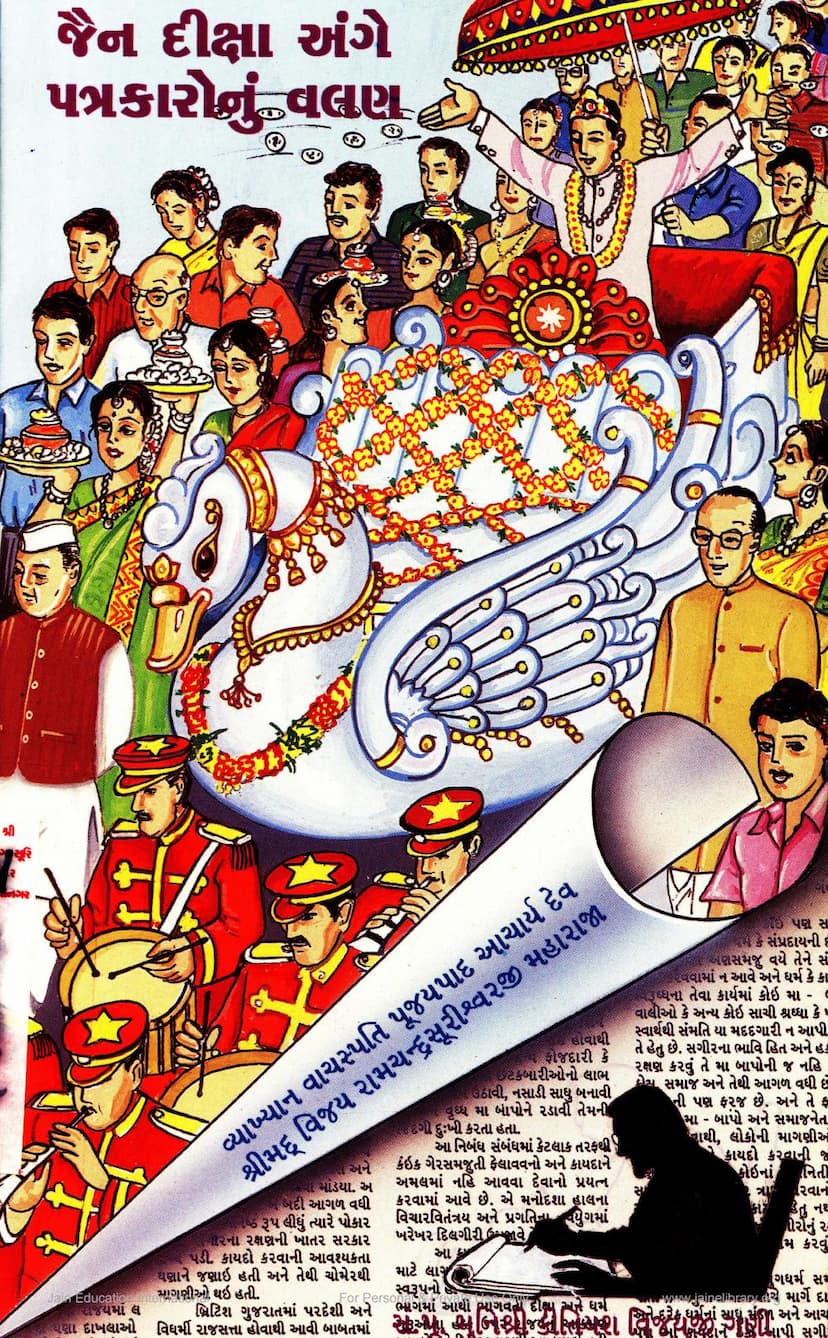Jain Diskha Ange Patrakaronu Valan
Added to library: September 2, 2025

Summary
This document is a collection of Gujarati texts related to the Jain faith, focusing specifically on the topic of initiation (Diksha) and the media's portrayal of it. The title of the primary text is "Jain Diskha ange Patrakaronu Valan" (Jain Initiation and the Attitude of Journalists). The author is Ramchandrasuri, and Kirtiyashvijay is listed as the editor. Sanmarg Prakashan is the publisher.
Here's a comprehensive summary of the key themes and arguments presented in the provided pages:
Overall Purpose:
The document aims to defend Jain initiation practices, particularly child initiation, against what the authors perceive as misrepresentations and criticisms by the media and certain segments of society. It argues for the purity and righteousness of Jain Diksha and seeks to correct misunderstandings.
Key Arguments and Content:
-
Defense of Jain Diksha:
- Jain Diksha is presented not as a terrifying act but as the highest and best form of education for life, aimed at making life good and beautiful.
- It's a path to renounce worldly sins and follow the teachings of great gurus.
- The core principles of Jain Diksha are the abandonment of violence, falsehood, theft, lust, and possession.
-
Critique of Media Reporting:
- The authors are highly critical of journalists and newspapers that, they claim, misrepresent Jain initiation without proper investigation or understanding.
- Newspapers are accused of spreading misinformation and creating public misunderstanding, potentially leading to a "wrong path" for people.
- Specific examples are referenced, such as an article in "Sayaji Vijay" from August 20, 1931, which is described as deviating from the truth and causing concern among the public regarding Jain initiation.
- The authors challenge the media to prove their accusations of coercion, deception, and harm caused by initiation.
-
Addressing Accusations Against Child Initiation (Bal Diksha):
- A central theme is the defense of initiating children. The document argues that Jain scriptures permit initiation from the age of eight, with parental consent.
- It counters claims that child initiation leads to significant "un-anartha" (harm or misfortune).
- The document asserts that initiated children are expected to live a pure life, not cause harm, and if they don't succeed in that, they at least improve themselves.
- It emphasizes that the decision to initiate is not solely based on age but on suitability and the child's inclination, often stemming from past life karmic impressions.
-
The Role of Parents and Guardians:
- The responsibility of parents and guardians to protect their child's future interests and rights is acknowledged.
- However, it's argued that if parents willingly give consent for initiation, this should be respected.
- The document questions why laws are not enacted to address parents who raise their children in immoral ways, leading them to crime or addiction, while focusing on restricting those who guide children toward spiritual paths.
-
The Concept of "Yug Dharma" (Duty of the Age):
- The authors question the notion that religious gurus should adapt to the "Yug Dharma" as presented by the critics.
- They argue that the true "Yug Dharma" involves protecting one's legitimate rights and that stopping children from following a spiritual path is contrary to this.
- They assert that the current era should encourage guiding children toward a noble path before they are corrupted by worldly desires.
-
Questioning the Necessity of a Law:
- The document strongly argues against the need for a law to prohibit child initiation.
- It asserts that Jain initiation is inherently pure and does not necessitate legal intervention.
- The authors believe that if accusations were true, legal cases would have been filed and convictions would have occurred, but this has not happened.
-
Philosophical and Scriptural Basis:
- The text references Jain scriptures and the teachings of learned scholars to support its arguments.
- It touches upon concepts like karma, reincarnation, and the gradual purification of the soul.
- The analogy is made between education in the secular world (starting from childhood) and spiritual initiation, suggesting that early spiritual grounding is beneficial.
-
Specific Examples and Counter-Arguments:
- The case of a boy from Dabhoi is mentioned, where the article claims the child was taken and initiated without consent. The response highlights that the boy himself stated he took initiation willingly and was not pressured, and later, with parental consent, took initiation again.
- The authors state that there are few instances of children falling away from initiation, and even fewer if the initiation was with parental consent. They argue that isolated incidents shouldn't be generalized.
-
The "Sanmarg Prakashan" Initiative:
- The document is presented as part of the "Acharya Shri Vijay Ramchandrasuri Smriti Granthmala" (Memorial Series of Acharya Shri Vijay Ramchandrasuri).
- This series aims to publish 108 books over five years, commemorating the anniversary of Acharya Shri Vijay Ramchandrasuri's passing. The specific book "Jain Diksha ange Patrakaronu Valan" is part of this series, with 22 books released in the fourth year of the project.
In essence, the document is a passionate defense of Jain initiation practices, particularly for children, arguing that they are misunderstood and unfairly criticized by the press. It champions the spiritual purity and beneficial nature of Diksha and urges for a more informed and less judgmental approach from the media and society.